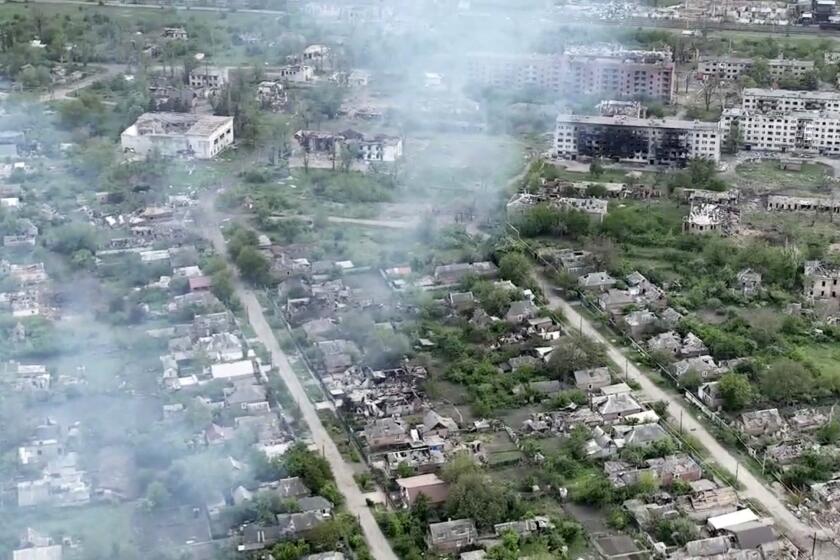Letters from Mindanao
The united states leveled Hiroshima with the atom bomb on Aug. 6, 1945, but the history-making news didn’t reach the Philippines until two days later. American troops there, like my father, were waiting apprehensively for plans to invade the Japanese home islands.
“It’s almost too good to be true,” he wrote my mother on Aug. 8 from Mindanao, where he was an Army field hospital doctor supervising public health measures for Filipinos malnourished after years of Japanese occupation. “The news we’ve been given describes a veritable Buck Rogers mechanism of destruction that is capable of erasing any city or nation. . . . For the first time, I feel that the war may end shortly and we can all go home, and I hope to God it’s so.”
By the next day, he was far more guarded but remained optimistic, noting further details about the atomic weapon and news that the Soviet Union had actively entered the war against Japan. “It’s damned fortunate that we were first in its military use and it may -- and probably will -- be the final all-important factor in ending this awful war.”
Then he penned a sobering postscript: “There is still something frightening about the new bomb, a weapon that truthfully is not pleasant to contemplate and that bodes danger for our future if human beings don’t quit acting like apes. The world had better come to its senses after this one.”
These past months, in reading my father’s 300-plus letters written 62 years ago, I realized that this endnote was no accident. More than joy, the cautious relief that framed his response to news of the wonder weapon was his coda to many months of correspondence about the corrosive aspects of war and the contradictions that fighting entails.
Less than three weeks before Hiroshima, he had written: “After almost four years in the army, I hate war, not in an objective way but as a very personal thing. When I hold a bullet in my hand or stare at a mortar, it’s a feeling that in this inanimate metal is the degradation of the human race, a precision-made missile containing all of the world’s hate.”
In his missives, my father had been scathing about “slick news stories” that my mother clipped and included in her daily letters, saying their glamorized tales of war bore no resemblance to combat. “The GI letters that I read as a censor are not only more eloquent than all the magazine stories but are so different as to make the latter ridiculous.”
While treating wounded infantrymen on Leyte in early January 1945, he wrote that every GI asks, “When is this war going to end and when can I go home?” At home, Americans had been told that Leyte was secured and that soldiers were mopping up Japanese army remnants. “The words are so misleading. The fighting is often more vicious and severe after the generals say the battlefield is ‘secure.’ I’ll never again be able to tolerate a war movie or political speech on military heroes, not after seeing newly dead American GIs come in on litters, spotting them from the wounded by seeing the undisturbed flies on their yellowish-white still skin, or whatever is left anatomically. Seeing the newly dead tells me that war prevention is the real job.”
Adding to the misery were the thousands of Filipino refugees with chronic diseases and many without enough food. Supplies were never sufficient, even for the bountiful U.S. Army, to take care of all the civilians. Yet from time to time, my father wrote of a stubbornly resilient humanity during war. When his unit left Leyte in early May for Mindanao, “a truly poverty-stricken mother of a child we had saved sought me out for personal thanks and a present of a dozen fresh eggs. Her family and those of many others lined the road in a collective ‘good-bye’ wave.”
And there were the situations bringing forth black humor. He recounted an order in early June from higher-ups to establish two whorehouses, “one for whites and one for colored, to stem the trouble and venereal disease that comes in all theaters when the G-Is want their women. . . . I am to take care of the medical angle and must meet with the C.O. [commanding officer], the M.P. officer and a ‘madam.’ So do I make small talk and ask ‘How’s business?’ ”
But little masked his lament at death and disease everywhere. When hearing American planes overhead on their way to smash Japanese still fighting in the Mindanao hills, he confessed, “I should exult, I know; the Japs have asked for the slaughter and deserve a complete defeat, yet I’m more or less confused in my emotions: war and its causes are so complex and sometimes, I fear, all is so futile.”
To mid-July news about Congress considering postwar mandatory military training for all young men, he wrote to my mother, “I wonder why no one has suggested that Congress pass a law for one year’s compulsory training in peace?”
On the morning of Aug. 15, 1945, when Japan’s offer of surrender was made public, my father watched dozens of warships in Macajalar Bay blow their whistles and fire smoke shells in an impromptu celebration. “I am emotionally limp, so long have I hoped for the end to this wasteful existence called war,” he wrote. “I will think of nothing but our soon-to-be reunion.”
More to Read
Start your day right
Sign up for Essential California for news, features and recommendations from the L.A. Times and beyond in your inbox six days a week.
You may occasionally receive promotional content from the Los Angeles Times.






